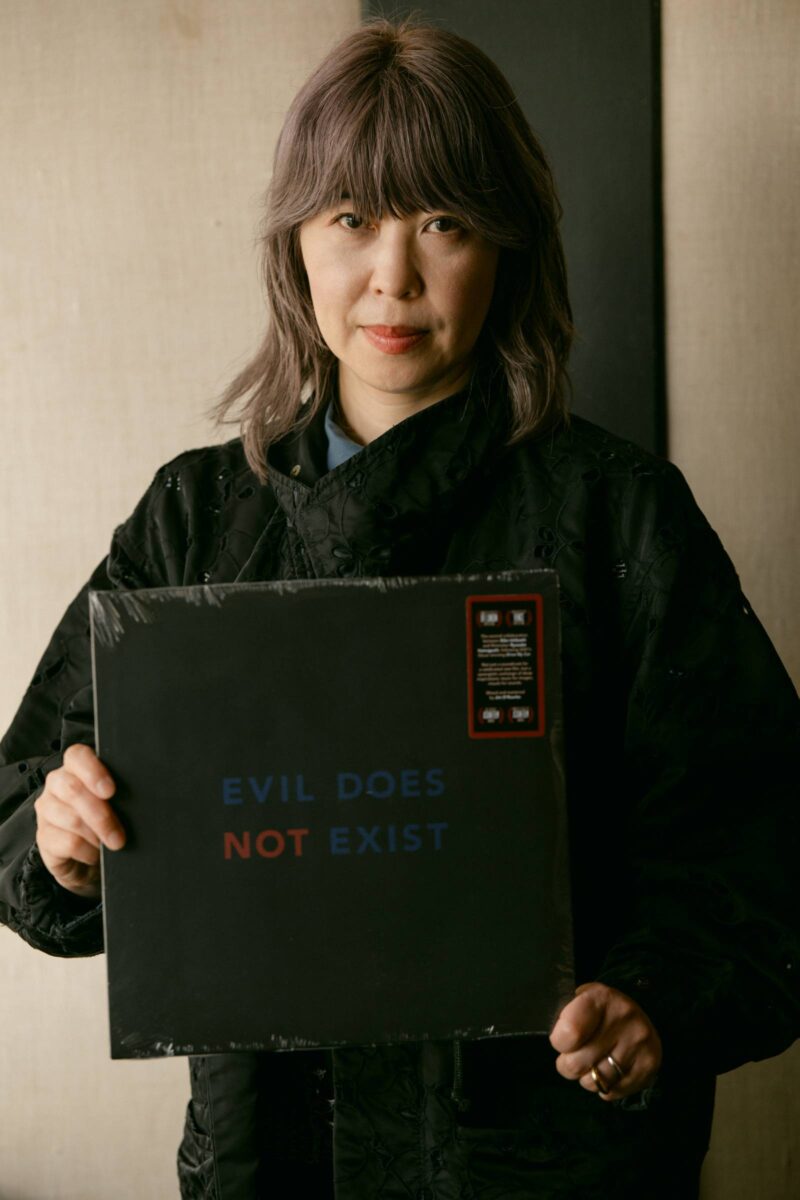Safe to say Drive My Car‘s success wouldn’t have reached its historic heights sans Eiko Ishibashi, whose musical contributions acted as both complement and counterpoint to Ryusuke Hamaguchi’s lengthy, ornate drama. Perhaps nobody would affirm this more than Hamaguchi: likely facing every opportunity a filmmaker, Japanese or otherwise, could want from the western world, he instead visited Ishibashi and troupe member Jim O’Rourke to film their performances in a small mountainous town, and from this emerged the dual projects Gift and Evil Does Not Exist.
After last week’s live performances of Gift at Film at Lincoln Center, I spoke to Ishibashi about the unique operation, her ongoing creative partnership with Hamaguchi, and attitude towards filmmaking practice.
Thanks to Stacy Smith, who provided interpretation.
The Film Stage: I saw Gift two nights ago––a very restorative experience. This quote kind of clarified why: “There is some element of improvisation because I’m reacting to that particular day.” What has New York brought out of your performances this week? Do things like jet lag, your hotel, whatever you just ate play a part in these day-by-day reactions?
Eiko Ishibashi: Yes, of course––all those things will influence my performance. For something like this––a project that’s continuous; I think yesterday was either my 13th or 14th time doing a live performance––I always want to do something new; I don’t want it to be a situation where I am not excited about going into it, because for the audience it’s of course for the first time. Or in most cases their first time. I feel like, maybe, in my last performance here in New York I didn’t succeed as much as I wanted to, but I did try something new, and I think that’s very important. But for me, the idea of continuously trying to make something about it new––this renewal process––is restorative for me.
Why do you think you didn’t succeed?
I don’t know if it’s as much that “I didn’t succeed” as that what I intended didn’t come out the way I had actually intended. So maybe what I was trying to do, in terms of the actual playing, wasn’t what I had meant to do––a different outcome.
Given the origin of these two films––Hamaguchi visiting you and Jim O’Rourke in the mountain area where you live, then capturing images of them––I’m curious how much home inspired these soundtracks: the things you hear on a daily basis, the sounds these environments conjure up for you. Hearing it again the other night… the music’s actually kind of scary. There’s something creeping and menacing about it. I don’t know if that has something to do with this also being an angrier film for Hamaguchi.
I do think it’s both. Being a rural area, we’re surrounded by nature––there are always deer and other animals scampering about. Because it’s the countryside we have a lot of cars that are accelerating quite quickly, so you could say we’re blessed to be in that kind of area. The other side of it, though, is that at night it’s pitch-black––all you really can see are car lights. So that definitely influences the music and the work itself. I think this played into the script and also the final images after it was edited; when I viewed that I really felt his anger. These are aspects that are quite strong, and I really think it’s both that influenced it.
Photos by Arin Sang-urai / Film at Lincoln Center.
When we interviewed you for Drive My Car you had said, “I didn’t try to make music that was too close to the characters’ emotions. I tried to make music that didn’t emphasize what the character was feeling too much.” But––without trying to psychoanalyze you too much––I wonder if a connection to the environment, and how this film is about its degradation, can’t help bringing you a bit closer to it all.
I think, in terms of the characteristics of this work, it’s actually quite different from Drive My Car. In the case of that film, you have the main character and it’s very clear what they’re feeling––this actually controls the film in a large way. However, when you talk about this project, the set-up is really: you have the nature and the people who are living in it. It’s not really a sense of trying to get close to something or not––in terms of making the music it was the same––but in terms of emphasizing the characters’ feelings or not. In this case it was more about the emotions are throughout the whole film, which I think might have made a larger impression or influence. The other main point I’d like to make is: I had a long email correspondence with director Hamaguchi prior to making this, and one theme we thought about together for a very long time was the memories of land. This is a theme we were inspired by.
“Memories of land” is interesting. Are these personal memories? Lifetime markers in different locations?
More so the history of land––various, respective lands––in that various places, whether it was destruction or something that caused changes in the land, I liked thinking about how the land was prior to that. The state it had been in before. This was something I found interesting for a very long time, and it’s also an interest I share with director Hamaguchi. Being that I’m in New York, I think I’m going to look for a book about the history of the land here.
You’ve said you and Jim O’Rourke are “much more interested in films than music.” Do you both have active ambitions to move into filmmaking––as in screenwriting and directing? It feels like the live performance of Gift, with its improvisations and reactions, is a kind of storytelling synonymous with Hamaguchi. But maybe I’m off-base there.
Well, Jim does make short films. For myself, as a student, there was a time when I thought about getting into film, but it does cost money and, also, you have to deal with many different kinds of people [Laughs] and I don’t know if I have the strength to do either of those things. For me, I prefer music because it’s myself in a room and I can do it that way; that’s my approach to making music. But about four days ago, I met Albert Lee at the Hong Kong Film Festival, and he had an interesting suggestion: for our next project, Hamaguchi can handle the music and I can handle the filmmaking.
Does he have any musical background?
I don’t know. But I’m interested in listening. [Laughs]
I know you rescored Fassbinder’s World on a Wire in 2016. Are there any films you’ve considered rescoring, or have even done so privately for your own amusement?
In terms of the Fassbinder film, this is one that was not really shown in theaters very much in Japan––this director’s work. I have a friend who’s in distribution, so as a way of supporting this film, I made a CD they would put with a pamphlet for promoting the film. So it’s not really that I am desiring to rescore many films, but if there’s something like that––where I have the chance to expose a large audience to a certain film and have it gain more recognition––I certainly want to cooperate. But in terms of Fassbinder: he’s a director who is legendary within film history, but unfortunately within Japan he’s not very well-shown, and that’s unfortunate.
There’s a big retrospective now of Hiroshi Shimizu, who is a bit lesser-known in America. I love Japanese cinema but there’s always blank spots, and––not to put you on the spot––I wonder if there are any Japanese filmmakers you really love but think are undervalued outside of the country.
One would be Kihachi Okamoto. But actually there’s people like Matsumura, who are more popular in the west than they are in Japan. Same for Shohei Imamura: you find a lot of his CDs overseas, but not so much in Japan. His reputation in Japan is not as good.
You’re performing the Drive My Car soundtrack at Le Poisson Rouge here in New York. Do you have expectations of what it’ll be like performing that music you recorded years ago? Do you have the muscle memory and emotional attachment, or have you moved on?
I actually think it’s a chance to redo it. This is an old performance, so I envision it as being a recreation of something I’ve done before. I don’t know if this is going to meet the expectations of the audience or not, but I will be performing solo. The actual soundtrack was a band performance, so it’s something that, by its nature, will be different, but I’m really looking to compose my live performance as a new narrative for Drive My Car––a new story.
How is it a new story?
Of course I will be performing the music that I recorded for Drive My Car, but it’s almost as if it’s going to be for a different film. What I mean to say is: if there’s an older film and you’ve watched it countless times, your experience is different, probably, every time you watch it. So in the same sense I’m looking for the audience to be able to take away that different feeling with this performance.
Evil Does Not Exist is now playing in limited release and expands throughout the month.



